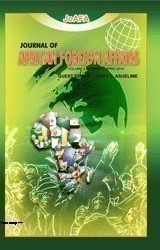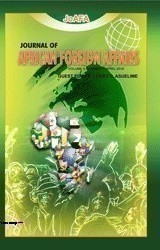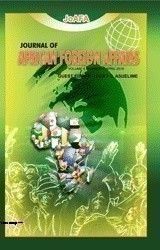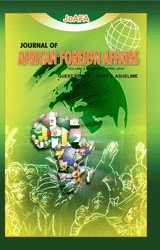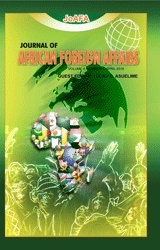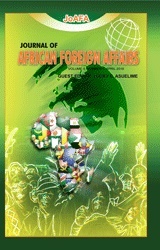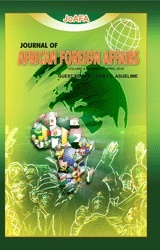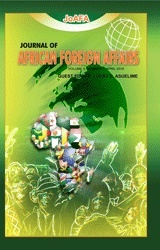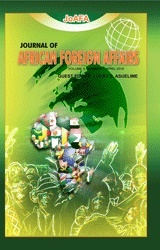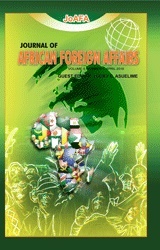
 editor@adonis-abbey.com
editor@adonis-abbey.com ![]() UK: 0207 795 8187 / Nigeria:+234 705 807 8841
UK: 0207 795 8187 / Nigeria:+234 705 807 8841
Adonis-Abbey's Journal Section
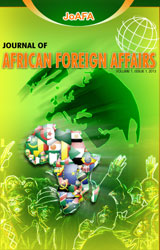
JOURNAL OF AFRICAN FOREIGN AFFAIRS (JoAFA)
Publication Frequency: Triannual ISSN: 2056-564X E-ISSN: 2056-5658
Journal of African Foreign Affairs (JoAFA) Volume 11, Number 1, April 2024
This issue of the African Journal of Foreign Affairs (JoAFA) is being published in a particularly turbulent geopolitical environment. Since the 2020s, the international order seems to be moving adrift: Brexit (2020); the United States’ (US) chaotic withdrawal from Afghanistan after the fall of Kaboul (2021); Russia’s war on Ukraine (2022); Gabon and Togo joining the Commonwealth (2022); surprise reconciliation between Saudi Arabia and Iran (2023); annexation of Nagorno Karabakh by Azerbaijan (2023); return of Syria to the Arab League (2023); civil war in Sudan (2023); October 7, 2023 events in which Israeli civilians were killed and/or kidnapped by Hamas and other non-state armed groups, followed by a new Israeli-Palestinian war; a series of military coups d’etat in western Sahel; and US’ military gesticulations in the Middle East where local conflicts are merging into one regional war. How does one explain this runaway geopolitical upheaval? How does one comprehend the multi............
Journal of African Foreign Affairs (JoAFA) Volume 10, Number 2, August 2023
This issue of the Journal of African Foreign Affairs has a variety of topics that can be classified in four categories: direct relationships with great powers such as France and China, the impact of international events on Africa such as the Russia-Ukraine-NATO war, international organizations and the relationships of a liberation movement such as the Southern African National Liberation Movements with the United Nations, and intra-African affairs. The range of topics reflects the increasing complexity of the environment in which evolve African affairs. Within a generation Germany might become the most important military power in the European Union. Will Europe experience a period of deindustrialization of which the United States will be the principal beneficiary? Will a Cold War materialize between China and the United States, much more complex than the previous one, and with a racial overtone? What will be the consequences of such an environment for Africa? And what are the cha............
Journal of African Foreign Affairs (JoAFA) Volume 10, Number 1, April 2023
Dear friends, This issue of the Journal of African Foreign Affairs focuses on Africa in world affairs with particular emphasis on the continent’s relationships with the BRICS nations including intra-BRICS interactions with India, China, and Russia and extra-BRICS politics vis-à-vis the European Union and in the Pakistan-India conflict. Of course, South Africa’s role is unavoidable. It ends with Africa’s own endeavors from the role of parliamentary diplomacy in foreign policy making in Zimbabwe, to regional organizations such as SADEC and COMESA, and to continent-wide economic reconfiguration in the form of African Continental Free Trade Agreement (ACFTA). Professor Jagdish Sheth of Emory University, author of Chindia Rising: Implications for Global Competitiveness (2011), in a video presentation titled “The African Awakening: When Will the Giant Wake Up” asserted that the second half of the 21st century will be an African century the same wa............
Journal of African Foreign Affairs (JoAFA) Volume 9, Number 3, December 2022
The issue of the Journal of African Foreign Affairs of December 2022 begins with practical analysis of specific cases such as the US and Africa in relation to the Agenda 2063, the Franco- Rwandese collaboration in southern Africa, and various aspects of China’s policy vis-à-vis Africa. It examines the challenges and opportunities of cyber diplomacy and cyber security, envisioning a move toward a “Borderless Regional End” in Africa, and discusses the “international relations” among subregional entities. In so doing, this issue combines praxis and theory by bringing to the reader the concepts of paradiplomacy, proposing an explanatory theory of the relationship between international NGOs and authoritarian regimes, and using Afro-decolonial principle to analyze the changes and continuities in China’s foreign policy towards South Africa. This illustrates the commitment of the African Journal of Foreign Affairs to be an integral part of the geopolitics of the production of inno............
Journal of African Foreign Affairs (JoAFA) Volume 9, Number 2, August 2022
This issue of the Journal of African Foreign Affairs features various aspects of the continent’s dynamism that are not usually highlighted in commentaries about Africa. The titles spanning from relationships with China, Saudi Arabia, and the BRICS countries to the role of non-state actors in foreign policy making, and to the ideological construct of terrorism show the agency of the continent in dealing with world politics. After all, isn’t Africa the “Real roots of the modern world” as Olúfémi Táiwò affirmed in an article of the same sub-title published in the Foreign Affairs issue of May/June 2022? Take for example the geopolitics of the production of innovative ideas: the first coffee shop opened in Oxford in 1650.The drink produced by Black labor and sweetened by the sweat of enslaved Africans created a culture for conversation and debates in Europe that would lead to innovative ideas. To borrow one more example from Táiw&og............
Journal of African Foreign Affairs (JoAFA) Volume 9, Number 1, April 2022
In this issue of the Journal of African Foreign Affairs, the reader will find analyses ranging from non-state actors, sub-state actors, sovereign state policies, and state-to-state relationships particularly with China. A regular reader may notice that the relationships between China (the biggest developing country) and Africa (the biggest continent with developing countries) have been more the focus of our contributors than the relationships between the African continent and Western countries. Signs of the time? Pivot to the East? It is also noticeable that, in most of Western books about geostrategy, Africa is barely mentioned. In that respect, a book by late Zbigniew Brzezinski, Strategic Vision: America and the Crisis of Global Power (2012) comes to mind. It may not be a matter of mutual ignorance but certainly that of emphasis. As the topics of this issue show, the emphasis is on the agency of African states and the role they play within the continent and vis-à-vis players ............
Journal of African Foreign Affairs (JoAFA) Volume 8, Number 2, August 2021
In his introduction of the journal Jeune Afrique’s issue of July 2021, Marwane Ben Yamed, raised a question that, I have no doubt, is in many minds. Is the African continent condemned to suffer, ad vitam aeternam, from political leaders that lack vision? I would answer no! Africa is moving forward: from the “Conferences Nationmales Soureraines” challenging old regimes in the 1990s and resulting in multi-party political systems to the food riots in the 2008-2011 period followed by the “Arab Spring” that affected some North African countries. The push for change, as Ben Yamed noted, continues such as in Burkina Faso (2014), The Gambia (2016), Zimbabwe (2017), South Africa (2018), Algeria and Sudan (2019), Mali (2020-2021), Senegal (2021), and ongoing protests in Tunisia (July-August 2021). The hundreds of millions of young Africans that will be on the job market in the decades to come expect new forms of governance, more performing eco............
To subscribe to any of the journals, Please Email Us.




